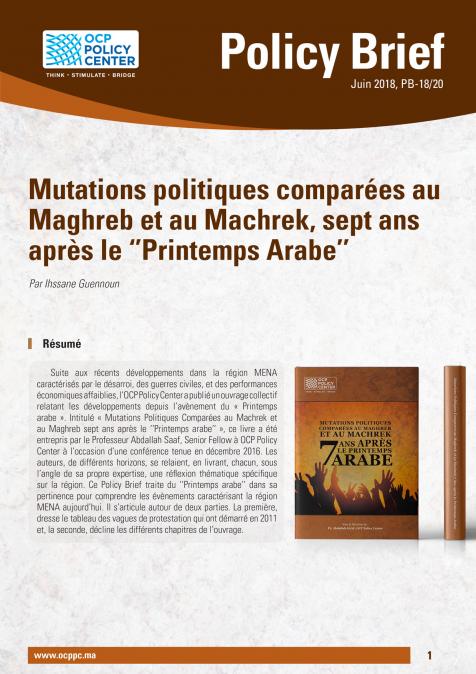RELATED CONTENT
-
September 30, 2019Notre Senior Fellow a répondu aux questions suivantes : 1/ Dans la région du Moyen-Orient et d’Afrique du Nord, en 2016 la part du revenu global des 1% les plus riches était 2,6 fois plus important que celle des 50% les plus pauvres. Sur quels leviers agir pour réduire les inégalités da...
-
AuthorsSeptember 1, 2019Income inequality is high in Morocco. In 2013, the share of national income1 of the richest 10% in Morocco stood at nearly 32%, 12 times higher than the share of national income of the poorest 10% of the population. This paper argues that, drawing on international experience, there is much more that Morocco’s government can do to reduce inequality while at the same time enhancing growth and – possibly – doing so in a manner that is budget-neutral or even budget-positive. Top of the ...
-
AuthorsAugust 23, 2019Income inequality is high in Morocco. In 2013, the share of national income of the richest 10% in Morocco stood at nearly 32%, 12 times higher than the share of national income of the poorest 10% of the population. High inequality can adversely affect long-term growth as it tends to be associated with underutilization of human potential. This paper argues that, drawing on international experience, there is much more that Morocco’s government can do to reduce inequality while at the ...
-
May 20, 2019Mohammed Chiguer - président du Centre d’Etudes et de Recherches Aziz Belal (CERAB). -- www.policycenter.ma ...
-
AuthorsFebruary 14, 2019Rabat, Capitale du Maroc, connait des mutations profondes depuis le début du siècle et du millénaire, conséquence de deux programmes initiés par Sa Majesté le Roi Mohammed VI. Le premier, lancé en 2004, autour de l’aménagement du site de la Vallée Bouregreg, le fleuve qu’elle partage avec Salé. Le second, conçu la même année, dans le cadre du programme de rénovation urbaine Rabat, ville lumière et capitale culturelle du Royaume. ...
-
AuthorsNchimunya HamukomaNicola DoyleArchimedes MuzendaNovember 29, 2018The twin cities of Rabat and Salé on Morocco’s west coast embody prominence in Morocco’s past and present, Rabat as capital and Salé as the third most populous city. Less than 20 years ago, however, Salé was charac¬terised by large slums, high unemployment, poor service delivery and limited mobility. Today, it is a changed city, providing housing to the majority of Rabat’s working class, with a modern tram linking the two cities. Morocco’s ‘Cities without Slums’ programme, launched ...
-
 AuthorsMokhtar GhailaniJuly 2, 2018Le tout dernier ouvrage qui vient d’être publié par l’OCP Policy Center, intitulé « Mutations politiques comparées au Maghreb et au Machrek, 7 ans après le ‘’Printemps arabe’’ », a fait l’objet d’une présentation au public, organisée le 27 juin 2018, à la Faculté des Sciences Juridiques, Economiques et Sociales de l’Université Mohammed V-Agdal- Rabat. Mr Abdallah Saaf, qui a supervisé l’ouvrage, a ainsi partagé avec l’assistance de l’Amphi I la raison d’être de cette nouvelle publi ...
AuthorsMokhtar GhailaniJuly 2, 2018Le tout dernier ouvrage qui vient d’être publié par l’OCP Policy Center, intitulé « Mutations politiques comparées au Maghreb et au Machrek, 7 ans après le ‘’Printemps arabe’’ », a fait l’objet d’une présentation au public, organisée le 27 juin 2018, à la Faculté des Sciences Juridiques, Economiques et Sociales de l’Université Mohammed V-Agdal- Rabat. Mr Abdallah Saaf, qui a supervisé l’ouvrage, a ainsi partagé avec l’assistance de l’Amphi I la raison d’être de cette nouvelle publi ... -
AuthorsJune 27, 2018Suite aux récents développements dans la région MENA caractérisés par le désarroi, des guerres civiles, et des performances économiques affaiblies, l’OCP Policy Center a publié un ouvrage collectif relatant les développements depuis l’avènement du « Printemps arabe ». Intitulé « Mutations Politiques Comparées au Machrek et au Maghreb sept ans après le ‘’Printemps arabe’’ », ce livre a été entrepris par le Professeur Abdallah Saaf, Senior Fellow à OCP Policy Center à l’occasion d’un ...
-
June 25, 2018Présentation du livre "Mutations Politiques Comparées au Maghreb et au Machrek: sept ans après le Printemps Arabe" Abdallah SAAF, Senior Fellow, OCP Policy Center www.ocppc.ma MOINS ...
-
 AuthorsHaim MalkaMay 8, 2018For decades, the North African Maghreb has been both a source of irregular migration to Europe and a gateway for sub-Saharan Africans transiting to Europe. Now the Maghreb is also emerging as a destination for migration. While Europe remains the preferred destination for most African migrants, reaching Europe is becoming increasingly difficult at precisely the time that migration pressures in Africa are mounting. Africa’s massive migration is just getting started—and this presents ...
AuthorsHaim MalkaMay 8, 2018For decades, the North African Maghreb has been both a source of irregular migration to Europe and a gateway for sub-Saharan Africans transiting to Europe. Now the Maghreb is also emerging as a destination for migration. While Europe remains the preferred destination for most African migrants, reaching Europe is becoming increasingly difficult at precisely the time that migration pressures in Africa are mounting. Africa’s massive migration is just getting started—and this presents ...







